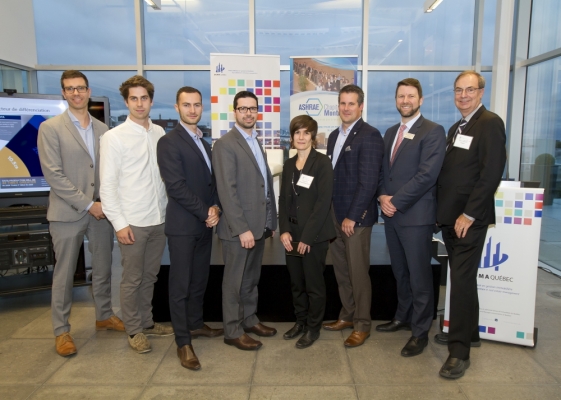On October 13 more than 70 participants got together at Musée Pointe-à-Callière for the 2016 edition of the Technical Management Symposium. Note that the annual symposium is a showcase for the technical management committee, which presents an overview of the best, most up-to-date operational practices so as to encourage sound technical management of property assets and to optimize efficiency, sustainability, physical security and property values. The 2016 edition was presented in partnership with ASHRAE Montreal and hosted by Patrice Bonin, chair of the BOMA Quebec technical management committee.
Our congratulations to the members of the committee for their commitment and excellent work in organizing this edition. The quality and diversity of the workshops and talks presented was very impressive.
BIM for the Life of your Building
This conference dealt with how BIM technologies and processes can help create work environments that are safe, healthy, effective and efficient for the lifetime of a building. The guest speaker was Danielle Monfet, Eng. M.Sc.A, Ph.D., a professor in the construction engineering department at the École des technologies supérieures.
Rooftop Pollinators
A survey of urban apiculture. Beekeeping is growing in popularity in several big cities such as Montreal, Quebec City and Toronto and is being adopted by many organizations interested in contributing to efforts at bee colony preservation. The presentation was by Alexandre MacLean, a beekeeper and co-founder of Alvéole apiculture urbaine.
Intelligent Buildings serving Managers and Occupants
What is an intelligent building in the 21st century? Are we well equipped to fully benefit from this technology? How can we attain better standards? What advantages do they offer?
That was the topic of discussion for a panel on intelligent buildings that presented the points of view of 4 industry professionals: Francis Banville, technical director – monitoring services, Bouthillette Parizeau; Jean-François Ouellet, director – major accounts, Building Efficiency division, Johnson Controls Canada; Robert Patenaude, energy consultant, Énergénia; and Charles Pelletier, product manager at Distech Controls. Simon Khaled, president of ASHRAE Montreal, acted as moderator.
Several aspects about intelligent buildings were discussed. Below are a few highlights of the talk.
What are the ecosystems that comprise an intelligent building? What processes must be monitored and supervised?
There are many ecosystems, but to give a few examples let's consider all the systems that can influence energy consumption such as ventilation, air conditioning and heating systems. They can be adapted in real time to the presence of building occupants and/or to factors such as the weather outdoors or movement sensors that automatically modify the indoor lighting. In addition, managing a building's elevators is greatly facilitated when information is centralized.
With digital technology, a system that provides very efficient, accessible connectivity throughout the building is another key element, regardless of the size of the building. Some hotels are now so sophisticated in terms of services offered to guests that it is possible, for example, to store client data so that when a guest returns, the room is automatically reset to the conditions selected during the previous stay at the hotel (temperature, lighting, etc.). Users can also manage activities via remote control, ordering meals on apps or websites provided by the hotel. The possibilities are vast.
Another good example concerns geolocation systems installed in some hospitals to locate patients and ensure that all is well. An intelligent building is a site equipped with a high-performance communications network that allows for storing and exchanging information and data, a service that is available to users, clients and the managers who operate and monitor the network.
Current systems are for the most part saturated. To bring things up to standard, those systems need to be updated with new technologies that can support rising demand so that ultimately the user is surrounded by a highly effective and "invisible" system that is at his disposal without him being aware of it.
In short, an intelligent building is a building equipped with control systems that lead to the convergence and storage of data that are linked to all operations, unlike an ensemble of systems functioning in silo or parallel fashion. It is a building with technologies that serve users, managers and owners by gathering the information essential to managers, data that on a daily basis helps them make the best management decisions possible.

